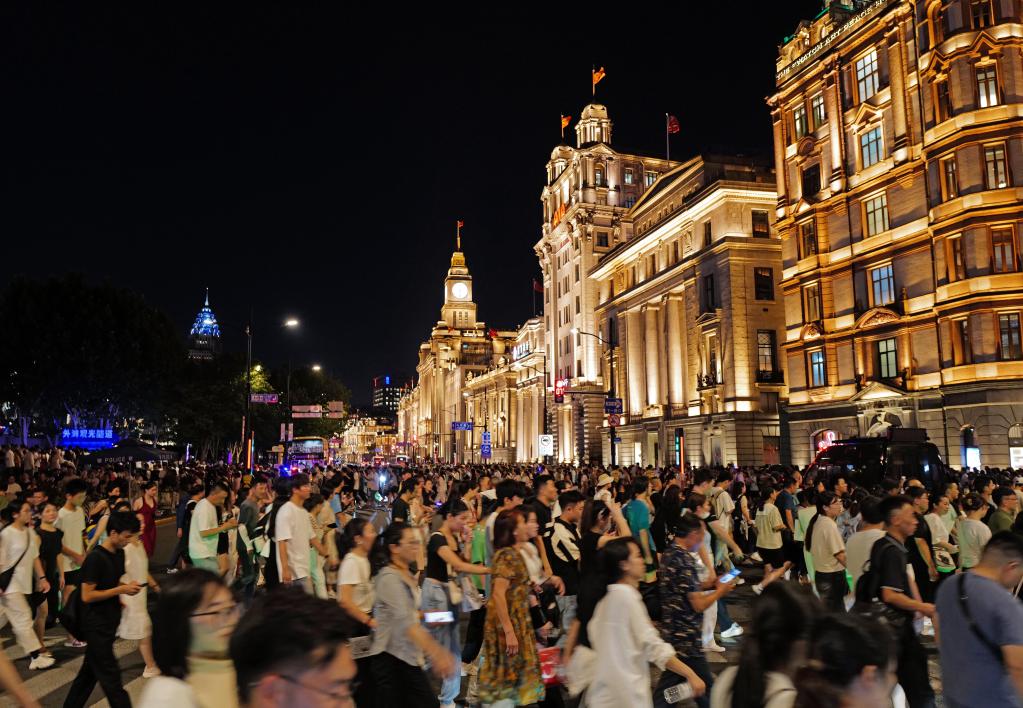How trendy "China Travel" shatters myths, bridges cultures

A foreign tourist interacts with locals during a performance in Huangluo Village of Longsheng County, south China's Guangxi Zhuang Autonomous Region, June 26, 2024. (Xinhua/Chen Sihan)
"People from all over the world will truly understand the wonderful Chinese culture and the enthusiasm of the Chinese people," said Jaeho Hwang, director of the Institute for Global Strategy and Cooperation.
BEIJING, July 31 (Xinhua) -- From the bustling capital city of Beijing to the mountainous city of Zhangjiajie, China is now abuzz with an influx of foreign tourists.
As many foreign travelers share their experiences online, "China Travel" has become a buzzword on overseas social media. The first-hand stories offer fresh perspectives that debunk the bizarre claims perpetuated by some Western media outlets against China and allow foreigners to capture a more comprehensive and authentic China.
"Most of my knowledge of China is limited to what I've heard in the news cycles over the last few years," Australian video blogger Josie said in a vlog about her first journey in China.
After visiting the eastern Chinese city of Shanghai, she said what she saw really surprised her.
"Most of the fears I had of China was simply not coming true. As I explored more of the city, constant smiles, curious kids and the general friendliness of everyone we met made me so comfortable and welcomed," she said.
Josie's experiences are echoed by millions of foreign tourists who are wowed by China's advancements in modern technology and rich culture as they ride on the trend of China travel. Many highlighted keywords like "unexpected," "never imagined," or "unbelievable" on social media to describe their travels in China.
Hidetoshi Tashiro, chief economist of Japan's Infinity LLC., who also recently traveled to Shanghai, said he did not see the so-called "desolate scenes" in Chinese cities mentioned in some news reports.

Tourists visit the Bund area in east China's Shanghai, July 22, 2024. (Photo by Yu Jiayi/Xinhua)
"What I saw were fuel-powered and electric vehicles driving alongside each other on the roads, as well as bustling new construction sites," he said.
"From cashless payments to traffic guidance systems, almost every aspect of China's society has been digitized. The streets are clean and the cityscape is beautiful," he added.
Besides major cities and landmarks popular with foreigners, many lesser-known cities and even rural villages in China are on the radar. Smaller and bespoke tours are also emerging to fulfill diversified needs.
For example, Zhangjiajie stands out for its 569 percent increase in inbound tourists in the year's first half. With its primordial forests and splendid mountains, foreign travelers are eager to see its magnificent natural landscape.
Sichuan Province in southwest China has become a popular destination for foreign tourists, particularly from South Korea. This surge in tourism can be attributed to the introduction of "panda tourism" itineraries by South Korean travel agencies. These itineraries gained popularity after Fu Bao, the first giant panda born in South Korea, returned to China.
Jaeho Hwang, director of the Institute for Global Strategy and Cooperation, stated that as more international tourists visit China, misunderstandings and prejudices will gradually diminish.
"People from all over the world will truly understand the wonderful Chinese culture and the enthusiasm of the Chinese people," he added.
The surge of "China Travel" excitement is ignited by China's expanding visa-free policy and improved services for inbound tourists.
China has now rolled out a 15-day visa-free entry policy for 15 countries on a trial basis and expanded the coverage of its 144-hour visa-free transit policy to 37 ports of entry, allowing 54 countries the opportunity for short-term travel and business visits.
China has also taken measures to improve services such as easing the use of mobile payment for foreigners, implementing reservation-free entry policies at scenic spots, and offering multiple languages and payment methods to assist international travelers in purchasing tickets effortlessly.
Thanks to these efforts, 14.64 million foreign nationals entered China through various ports in the first half of this year, an increase of 153 percent year-on-year. Remarkably, 8.54 million foreigners entered visa-free, a 190 percent leap from the previous year, according to the National Immigration Administration.
"This demonstrates China's determination to further expand people-to-people exchanges and improve the institutions and mechanisms of high-level opening-up," said Hwang.
As the world seeks a deeper understanding of China, the country welcomes this enthusiasm and curiosity. With an increasing number of foreign travelers visiting China, their stories will transcend borders and foster mutual understanding.
Photos
Related Stories
- Township trip trendy among desk jockeys seeking relaxation, not ‘consumption downgrade’ but new economic opportunities
- Visa-free policy to invigorate tourism cooperation between HK, Hainan: HKSAR gov't
- China revs up hospitality, boosts services to ride "China Travel" boom
- China sees 14.3 percent more domestic trips in H1
- Chinese tourist arrivals to Mongolia jump in H1 2024
Copyright © 2024 People's Daily Online. All Rights Reserved.









